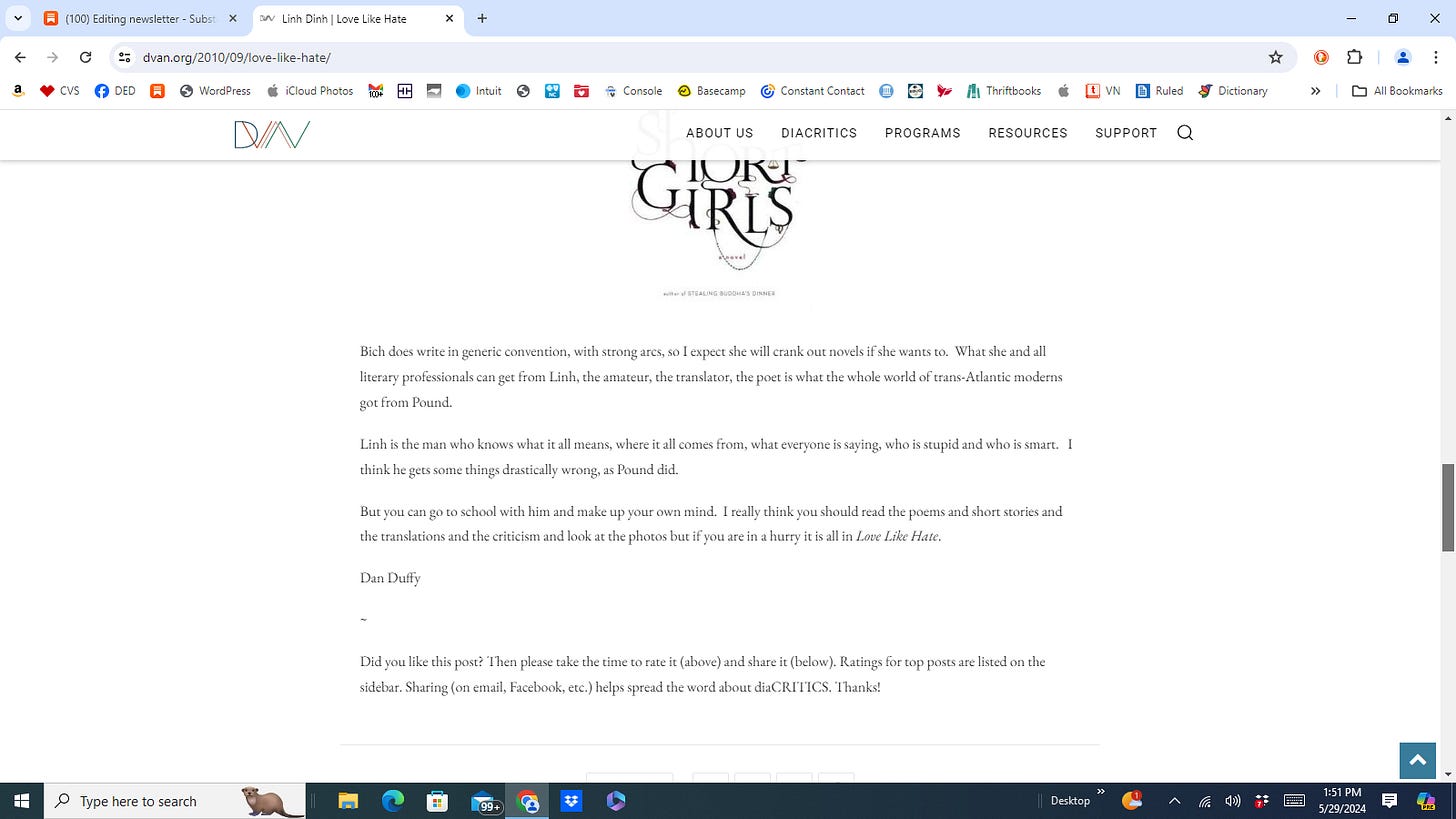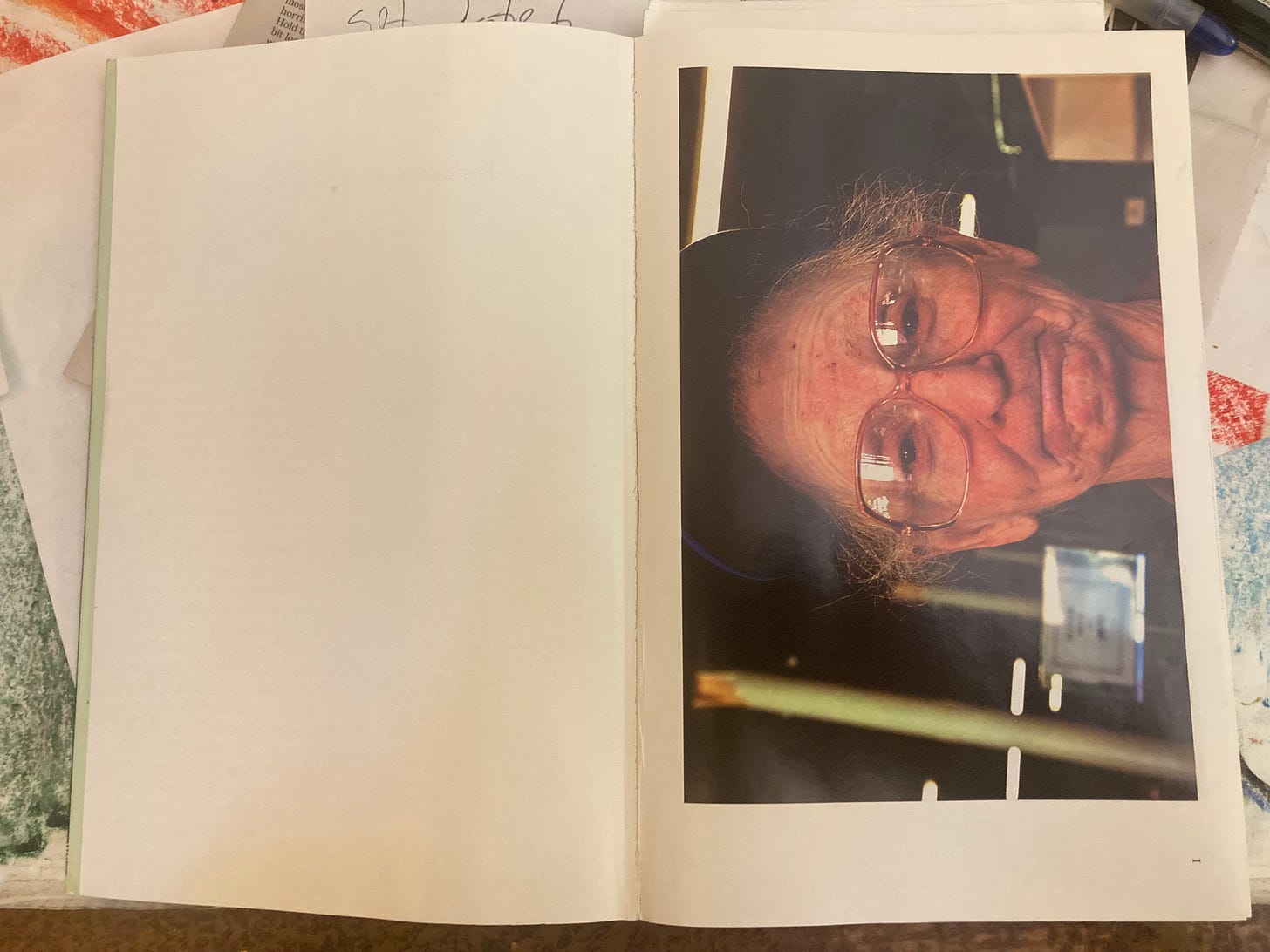Love Like Hate (i of 1)
from poet Linh Dinh and reviewer Dan Duffy of the diaCRITICS of the Diasporic Vietnamese Artists Network
Diasporic Vietnamese Artists Network
diaCRITICS
LITERATURE REVIEWS
Love Like Hate
Dan Duffy
Sep 26, 2010
In 2021, it came to our attention that the featured writer, Linh Dinh, has expressed anti-Black, anit-Semitic [sic], and overall harmful views since the publication of this post. Linh Dinh’s views do not reflect the values of diaCRITICS. This post will remain available for archival purposes.
Was this disclaimer the first I read of the difficulty? I don’t know. My earliest letter about my friend’s new views was June 11, 2022.
I would not be writing to you about the poet if I thought he had expressed anti-black views. I know him as an ethnic white of his immigrant Philadelphia.
There he once walked me for a cheesesteak by the shrine where Daniel Faulkner fell dead after shooting Mumia Abu-Jamal, to see what I thought about that. I think that I would be lucky to arrive at the hospital alive after waking up in a shoulder holster next to a dead cop.
Another old friend of mine, a second Philadelphia man, a third Viet Nam hand, the poet W.D. Ehrhart has shared with me his critical distance from the MOVE collective whom Mumia supported. I feel sure they were a royal pain in the neighborhood.
Bill’s views, and mine, could well impress other liberal Democrats as anti-black. Many especially in the arts and in education have viewed for instance Daniel Patrick Moynihan as anti-black since his 1965 report. I don’t.
The diaCRITICS of the Diasporic Vietnamese Artists Network are brave, honest, and kind people. Every artist in the network could lose their audience for tolerating an anti-black poet. Any teacher among them could get fired. Every researcher could be denied a grant.
They could in caution for the common enterprise have erased Linh Dinh from their publications without remark, sending my review of his novel down the memory hole along with him. They instead attached this mild statement of fact.
Again, I would not have a thing to do with Linh if I thought he was expressing anti-black views. But I can see why someone might say so or what’s more have nothing to do with me.
As to anti-Semitic. That is a word Jews call each other just as integrationist, liberal Democrats in favor of affirmative action on a level playing field with public health call each other anti-black no matter whether we play for shirts or skins, so we may compete with one another rather than unite and govern.
Who knows what anti-Semite means any more. The poet has recognized in our friendly correspondence my understanding that he blames Jews for this and that.
So I call him a Jew-blamer. It is important to him that he blames specific Jews for certain deeds. None of us provokes his anger without cause.
I have noticed him nonetheless often blaming “Jewish thought” for all he objects to about the modern world. That was what the man who coined the word meant by anti-Semitism. Wilhelm Marr distinguished his modern social theory from traditional Jew-hating.
Linh might know that, might not. Now you do. I am accustomed to people blaming us or hating us. It is a mitzvot of their meshugas, a crazy you can count on. I regret that my friend’s life and reasoning has brought him to it.
The Jew-blaming is part of a turn the poet has taken in his ethnographic reports first from around the United States of America and then around the world. He has spoken up in the global movement supporting Donald Trump, Vladimir Putin, and the People’s Republic of China, against Israel and masks and vaccines.
Fine. So a mad poet has objections to medicine and Torah. His catch-phrase “jewjab,” falls short of incitement, within the bounds of civil dissent, while asserting plainly that he is being a jackass, showing his asshole.
We each have got one. I think he came to asshole views in a disinterested pursuit of truth that already had marginalized him. Friend and relative of many among the wretched of the USA and the earth, a member of the profession whose colleagues have listened to the world talk about their bodies for 1 hundred years,
I was startled not by his arguments but that such a humane and kind man of letters had come to them. We all make mistakes. They aren’t the only interesting things about us. Here again is my review of a beautiful book about the same things he now makes ugly from.
The poet Linh Dinh has written a novel. It is a poet’s novel. Listen to the title: Love Like Hate. How has that not been a proverb for 500 years?
The novel’s most attractive character is such language, dealing from the old Anglo-Saxon and cherry-picking gaudy gems from all the other registers. Nobody talks like that and I can listen to it forever.
If Linh started cranking out novels one would speak of P.G. Wodehouse and Raymond Chandler and Henry James, the writers you read to learn the chord changes in English. I don’t think he will become a novelist because you don’t read this one for the genre conventions.
Every character does have an arc, a mild one. There are a mother and daughter and the men in their lives, all in Saigon since about 1950. They go through a lot and notice it somewhat.
If you want a plot summary, god help you. The life of the book is in noodling around like Tom Robbins and in marvelous cameos, with their right names, of contemporary Vietnamese authors.
Let Wikipedia sort it out. I have known and read Linh Dinh for twenty years and want to tell you what he’s up to. Linh Dinh is a disillusionist and a Vietnamese nationalist.
Linh Dinh is here to tell you that life in the United States is not rich and Vietnamese culture is nothing much. He mocks superstition and insists that the observable daily round is greed and lust directed by stupidity.
As he writes he teaches a patriotic creed that you aren’t going to get from the loudspeakers in the Socialist Republic, from foreigners who feel sorry, from exiles who yearn, and travelers who gawk.
It is the way of thinking that motivates my work. It is what is interesting about Viet Nam.
The Vietnamese at home are more gangsters struggling over a state. Vietnamese Americans are more Italians, Napolitani and paisan such as I grew up with New Haven, dropped into the black and white race war here.
What is interesting is a perspective from a solidly successful anti-colonial struggle that was nonetheless a disaster. Irony right down to the smallest details of daily life.
That quality of history is why I call myself a Vietnamese nationalist as well as a Southern liberal and a French republican. It has powered Linh Dinh through a career of solid intellectual accomplishment which we have made as accessible as we can through his Wikivietlit entry.
That accomplishment is characterized by Linh’s discomfort and ferocious competence in both English and Vietnamese, by his Poundian advocacy of the new and devotion to his colleagues, surging protean productivity, by compassion, by anger.
Since writing the novel he has been roaming the streets of the United States, taking pictures of the abject poor who live there, the working poor who walk there, and the illusions we post on the walls and in the shop windows. Take a look at his State of the Union.
The work of Linh Dinh for the common reader is a pedagogy in realism, in life for most people most of the time. The Vietnamese-language author he most reminds me of in subject, intellect and compassion is the comic novelist Nguyen Ngoc Ngan.
Linh is after all a literary man and Ngan is emcee of Paris By Night so I don’t expect either of them ever to take that comparison seriously. The Vietnamese author in English whose concerns seem to me closest to Linh’s is Bich Minh Nguyen.
Her essays and her novel Short Girls come out of Linh’s Saigon, in the flint tones of a Balzacian Middle West, with characters scrambling for the money and love they need in the grip of illusions about what they want.
Bich does write in generic convention, with strong arcs, so I expect she will crank out novels if she wants to. What she and all literary professionals can get from Linh, the amateur, the translator, the poet is what the whole world of trans-Atlantic moderns got from Pound.
Linh is the man who knows what it all means, where it all comes from, what everyone is saying, who is stupid and who is smart. I think he gets some things drastically wrong, as Pound did.
But you can go to school with him and make up your own mind. I really think you should read the poems and short stories and the translations and the criticism and look at the photos but if you are in a hurry it is all in Love Like Hate.
Dan Duffy
6 previous Viet Nam letters have addressed the work of Linh Dinh. 4 concern his Postcards from the End of America. The first, on June 11, 2022, judges the book by its cover.
The second, on August 6, 2022, looks at the poet’s postcards from Williston, Wolf Point, the Tri- Cities of Washington, and Portland, Maine.
The third, on August 22, 2022, considers the table of contents of the book and the format of all entries.
The fourth, on May 11, 2023, considers the poet’s photographs.
That first letter on Postcards from the End of America mentions the author’s views of Jews. So does the second. Another letter, 13 Ways of Looking at a Jew Hater, on April 29, 2023, addresses them directly.
Prompted by my good friend’s work I spelled out my own view in Jews at Viet Nam letters on October 17, 2023. What are friends for?
Viet Nam letters respects the property of others under paragraph 107 of United States Code Title 17. If we asked for permission it wouldn’t be criticism. We explain our fair use at length in the letter of September 12, 2022.
The colophon of these Viet Nam letters, directly above, shows the janitor speaking with poet David A. Willson on a Veterans Day.

















